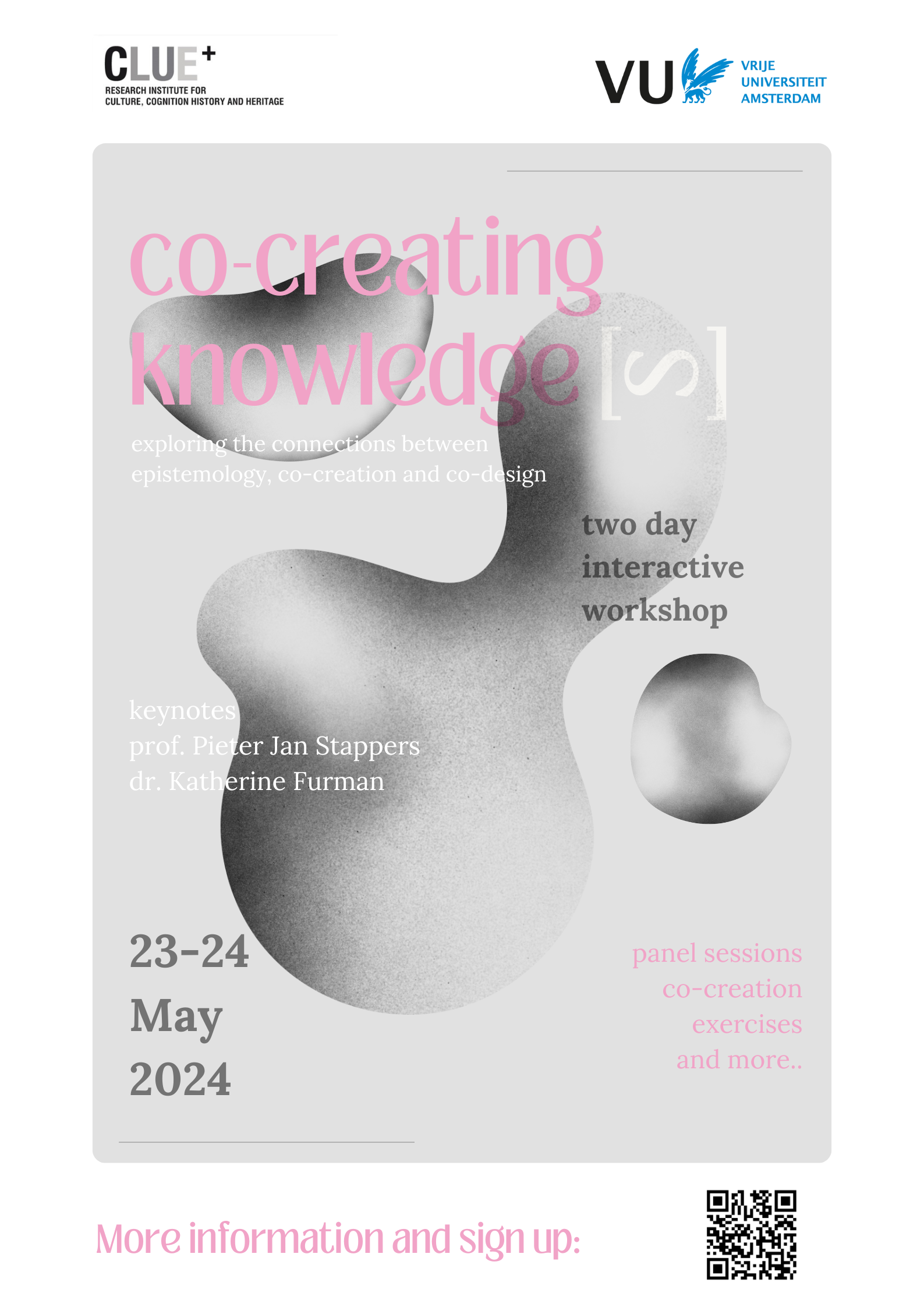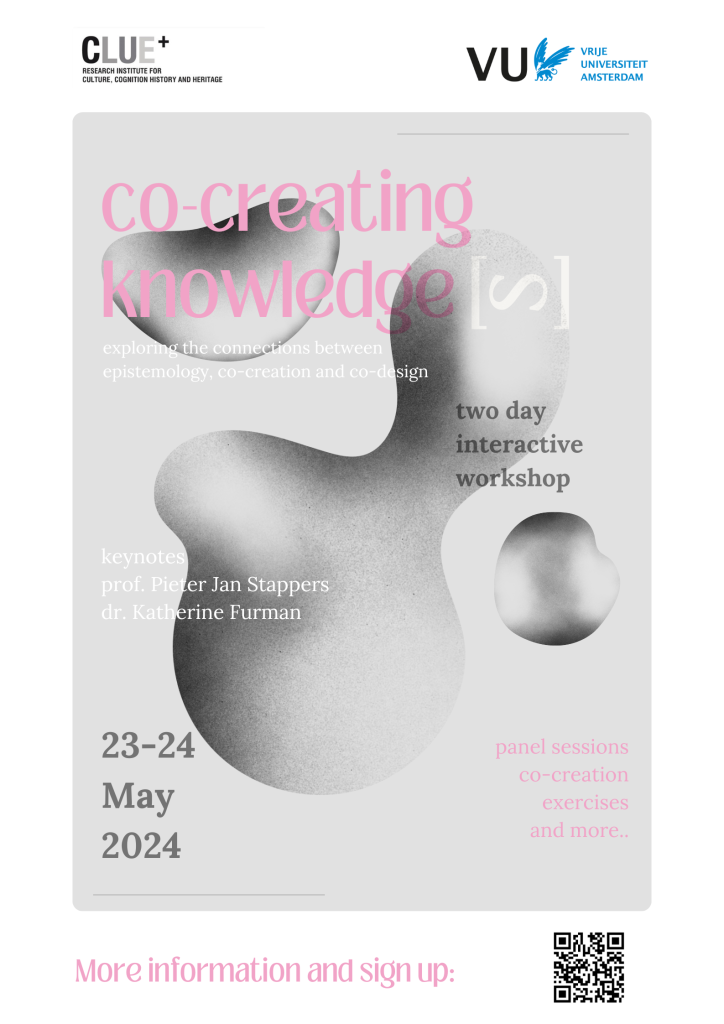
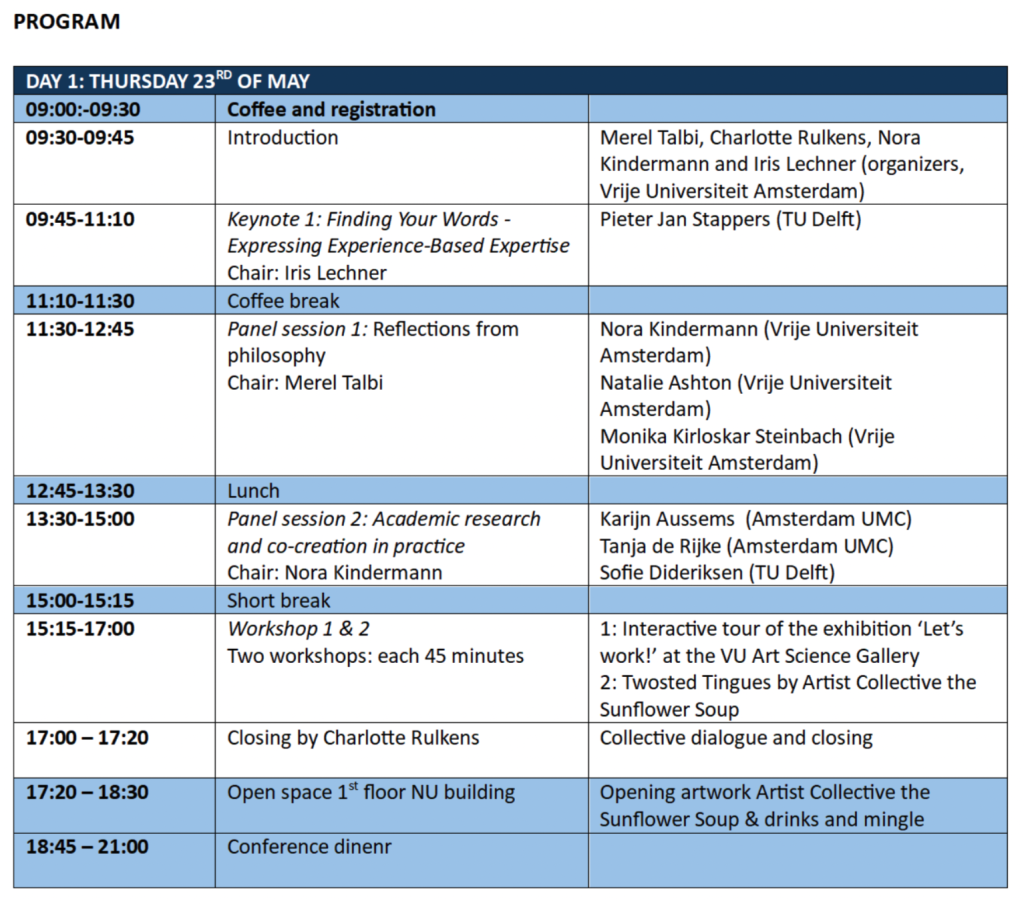

Event details
Date: May 23-24, 2024
Location: Vrije Universiteit Amsterdam, De Boelelaan 111, 1081 HV Amsterdam
Registration: Please register for the workshop here. Space is limited so please register as soon as possible.
Contact information: i.m.lechner@vu.nl & n.n.kindermann@vu.nl
Description
/ Co-creating knowledge[s] / The use of co-creation is well established in multiple research fields, such as design research, participatory action research, and public health research. Epistemologists, however, have not yet considered its potential merits. This workshop explores the opportunities for co-creation in epistemology, and how insights from epistemology can benefit co-creation.
/ Program / Over the course of this two-day workshop, we bring together a variety of stakeholders. This includes theory-based contributions from philosophers and epistemologists and speakers who reflect on their experiences using co-creation in practice, such as artists, museum professionals, and researchers. The set-up of the workshop creates a space for interdisciplinary and inter-institutional dialogue between academic, artistic, and socially engaged speakers. We will jointly explore two themes:
/ Knowledge theory and co-creation / The first theme that the workshop addresses is how different conceptions and theories of knowledge can inform and strengthen co-creation. What can we learn from philosophy and epistemology? How can co-creation aid the communication of situated knowledge, and foster understanding across differences in a democratic manner? How can co-creation prevent epistemic injustices, and foster relational humility in sharing knowledge and understanding?
/ Co-creating knowledges in practice / The second theme of this workshop is inquiring into how co-creation can help to engage with and appreciate diverse and non-verbal types of knowledge and understanding in practice. What can we learn from applying co-creation in different settings, such as art, health care, and societally engaged research? Can co-creation broaden our idea of who is seen as a genuine knower? And can co-creation be applied in epistemology to improve and democratize our (epistemic) lives.
Programme
The program includes a mix of keynote presentations, co-creation exercises, panel sessions, and short workshops (see above).
Extras:
- Interactive workshop in collaboration with the VU Art Science Gallery
- Workshop dinner on Thursday the 23th of May
Keynote presentations, panel sessions and workshops
KEYNOTE 1: FINDING YOUR WORDS – EXPRESSING EXPERIENCE-BASED EXPERTISE
Pieter Jan Stappers (TU Delft)
KEYNOTE 2: IN DEFENCE OF STREET CORNER SOCIAL EPISTEMOLOGY
Katherine Furman (University of Liverpool)
PANEL SESSION 1: REFLECTIONS FROM PHILOSOPHY
Nora Kindermann (Vrije Universiteit Amsterdam)
Crash Course Social Epistemology
Natalie Ashton (Vrije Universiteit Amsterdam)
Learning From and With Autistic Communities
Monika Kirloskar Steinbach (Vrije Universiteit Amsterdam)
Co-Creating Knowledges: For Whom and Why?
PANEL SESSION 2: ACADEMIC RESEARCH AND CO-CREATION IN PRACTICE
Karijn Aussems (Amsterdam UMC)
Co-Creation Of Chances And Choices: Participatory Action Research With Disadvantaged Young People Focused On Their Self-Actualization
Tanja de Rijke (Amsterdam UMC)
Reflections On A Co-Design Process Of A Communication Tool With People With Cognitive Complaints, Their Loved Ones, And Healthcare Providers
Sofie Dideriksen (TU Delft)
Guest or stakeholder? Approaching participatory design with victims in the criminal justice system
PANEL SESSION 3: ART, EXHIBITIONS AND CO-CREATION IN PRACTICE
Hester Huitema (Museum Rembrandthuis)
Co-creation as inclusive approach for developing an exhibition
Femke Awater (Amsterdam Museum)
Collecting the City – a work in progress
Elisa Matse (de Veldacademie)
Co-creation and participation in public administration. And then what?
WORKSHOP 1: Interactive tour ‘Let’s Work!’ exhibition by the VU ART SCIENCE GALLERY
Join us for an interactive tour of the VU ART SCIENCE gallery’s current exhibition Let’s Work!. Work is an important part of our existence that helps determine our identity. Work gives us fulfilment and provides a sense of connection. But work is also based on an economic system linked to abuse of power and exploitation. Who decides what is work and what is not? How did globalisation and advances in technology change the perception of work? Let’s Work! explores the concept of work through artworks by Jorrit Paaijmans, Nicoline van Harskamp, Ton Kruse – Faculty of In-humanities, and Rob Voerman/Stichting Kaikoesie. In the tour you will receive an insight into the specific artworks, whilst reflecting on the themes and topics discussed with the participants.
WORKSHOP 2: Twosted Tingues by Artist Collective Sunflower Soup
The artist collective Sunflower Soup organises a workshop connected to the textile artwork ‘VU common language’ that will be revealed the same evening in the New University Building. This work is the result of a co-creation process and includes newly developed letters, signs and symbols, developed, designed and made by students and employees of the VU.
In this workshop we want to start ‘interpreting’ the artwork and the new letters, signs and symbols. How can they be used? Is it possible to communicate with these signs? Do the letters have a unique sound? Do these signs open a different way of thinking, compared to Roman alphabet we use in Dutch and English? We will try to answer these questions through play, talk, speculation, and fantasizing.
WORKSHOP 3: Closing Reflections through Co-Creation
In the closing session Nora Kindermann, Charlotte Rulkens, Merel Talbi, and Iris Lechner will provide an interactive program to collectively reflect on the two workshop days. What have we learned? What do we take away from the talks, sessions, panels and workshops? How can we move forward? Through various playful exercises we aim to develop collective take-aways.
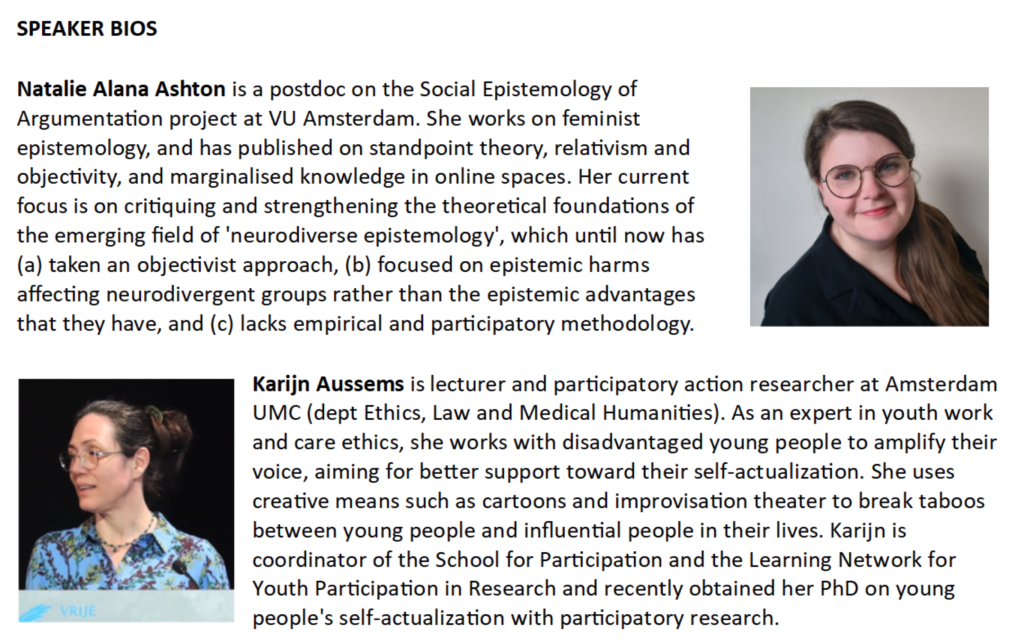
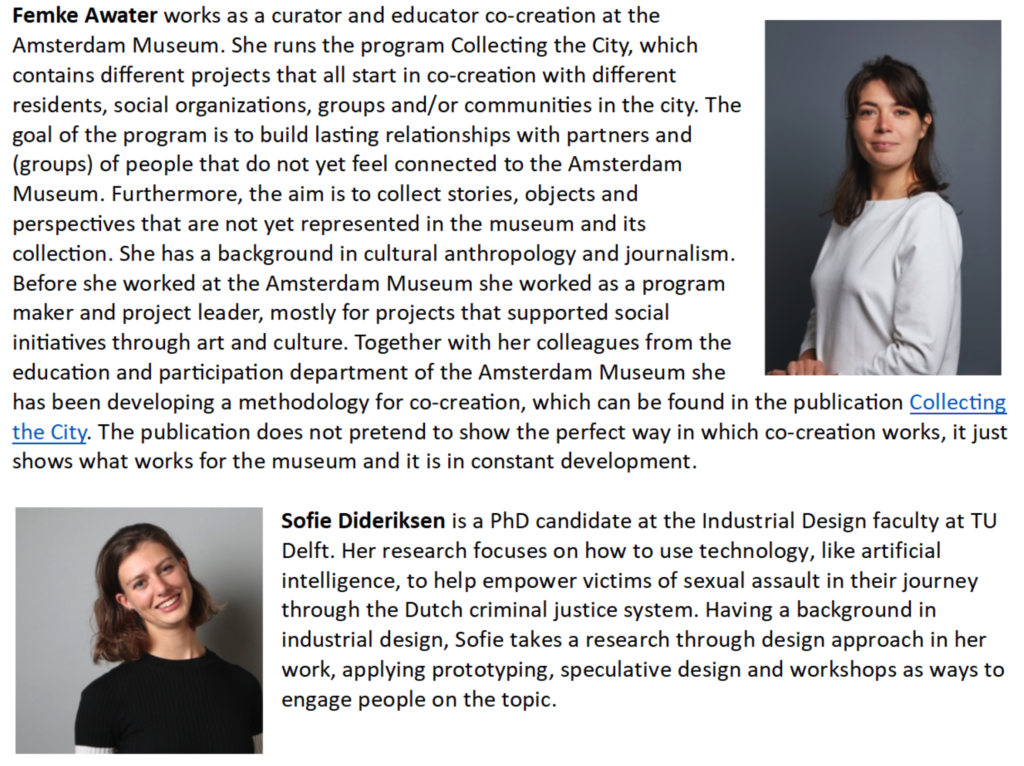

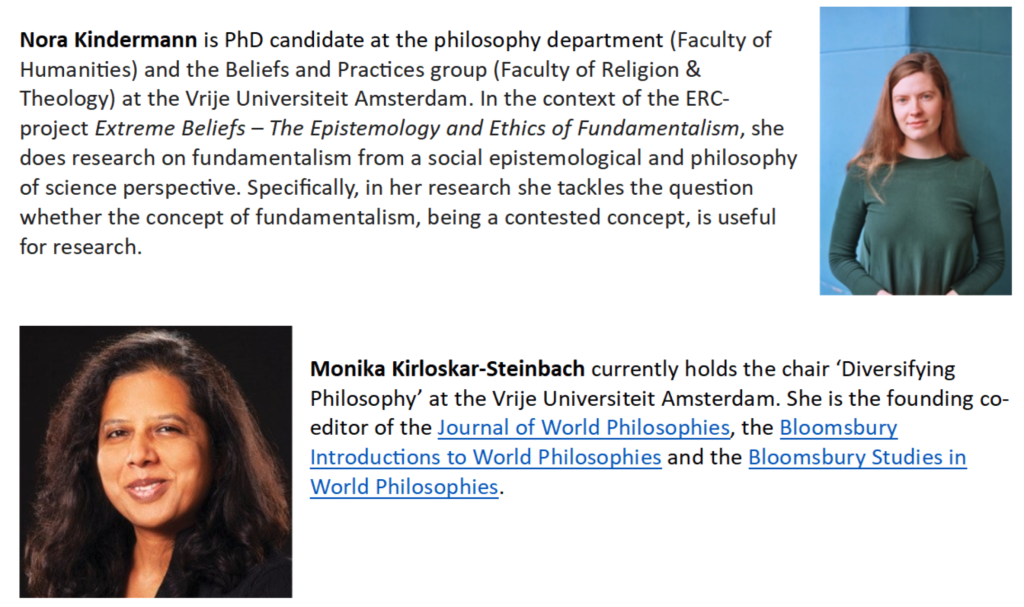
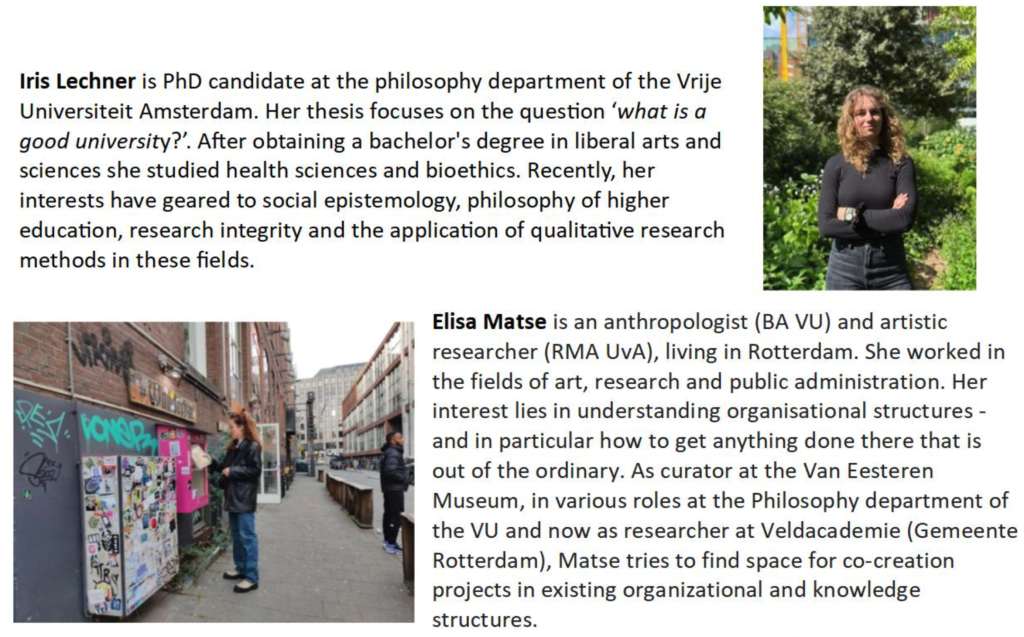
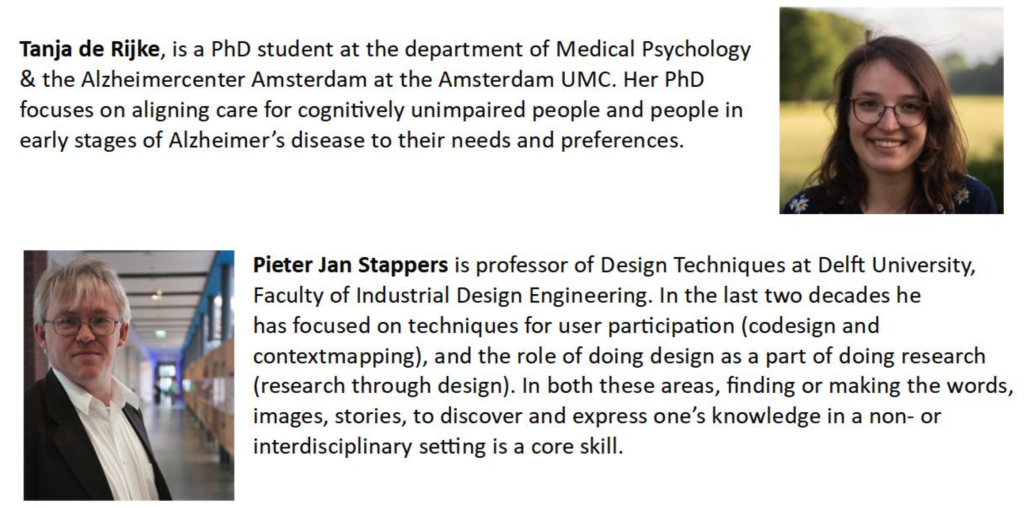
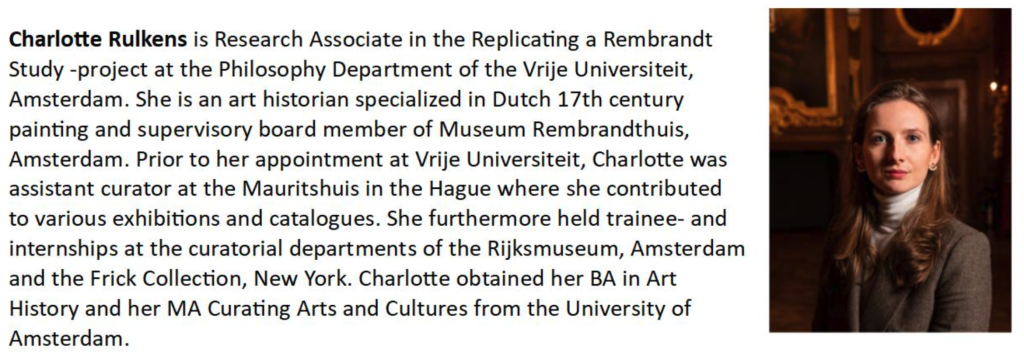


This workshop is financially made possible by a grant from CLUE+, The Interfaculty Research Institute for Culture, Cognition, History and Heritage and the Abraham Kuyper Centrum at the Vrije Universiteit Amsterdam.
Organising committee
Iris Lechner, PhD Candidate, Vrije Universiteit Amsterdam
Nora Kindermann, PhD Candidate, Vrije Universiteit Amsterdam
Merel Talbi, PhD Candidate, Vrije Universiteit Amsterdam,
Charlotte Rulkens, Research Associate, Vrije Universiteit Amsterdam
Privacy policy
Find our privacy policy here.


